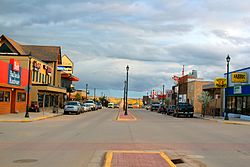Watford City, North Dakota
| Watford City, North Dakota | |
|---|---|
| City | |

Main Street Watford City
|
|
| Motto: "Come be our guest" | |
 Location in North Dakota |
|
| Coordinates: 47°48′9″N 103°16′50″W / 47.80250°N 103.28056°WCoordinates: 47°48′9″N 103°16′50″W / 47.80250°N 103.28056°W | |
| Country | United States |
| State | North Dakota |
| County | McKenzie |
| Founded | 1914 |
| Government | |
| • Mayor | Justin Voll |
| Area | |
| • Total | 1.41 sq mi (3.65 km2) |
| • Land | 1.40 sq mi (3.63 km2) |
| • Water | 0.01 sq mi (0.03 km2) |
| Elevation | 2,119 ft (646 m) |
| Population (2010) | |
| • Total | 1,744 |
| • Estimate (2015) | 6,708 |
| • Density | 1,245.7/sq mi (481.0/km2) |
| Time zone | CST (UTC-6) |
| • Summer (DST) | CDT (UTC-5) |
| ZIP code | 58854 |
| Area code(s) | 701 |
| FIPS code | 38-83860 |
| GNIS feature ID | 1032701 |
| Highways | US 85, ND 23, ND 23 Alt. |
| Website | City website |
Watford City (Hidatsa: abaʔaruʔush), founded in 1914, is a city in and the county seat of McKenzie County, North Dakota, United States. The population was 1,744 at the 2010 census. and the Census Bureau gave the 2015 estimated population as 6,708, making Watford City the twelfth largest city in North Dakota. Because Watford City is part of the Bakken field, the North Dakota oil boom has significantly increased population and construction since the 2010 census.
The main offices of Frontier Energy Group, First International Bank, and the headquarters of McKenzie Electric Cooperative are in Watford City. The local newspaper is the McKenzie County Farmer.
In 1913, a few prospective businessmen located on the townsite of the future Watford City in anticipation of the arrival of the first Great Northern Railroad train. The Northern Land and Townsite Company, a division of the Great Northern, platted the town and sold lots in June 1914. Building began immediately, and many businesses and homes were moved from Schafer, which eventually became a ghost town. Watford was incorporated in June 1915, and was named by Dr. Vaughan G. Morris (1879–1940) for his hometown of Watford, Ontario. A year later the town added "City" to its name to differentiate itself from Wolford in Pierce County.
The Great Northern planned to extend its line to New Rockford and in 1914 began building the "Madson Grade," one of the longest dirt filled railroad grades in the country about a mile west of town. Two years later the grade was ninety feet high and nearly a mile long, but the project was abandoned shortly before the United States entered World War I.
...
Wikipedia
